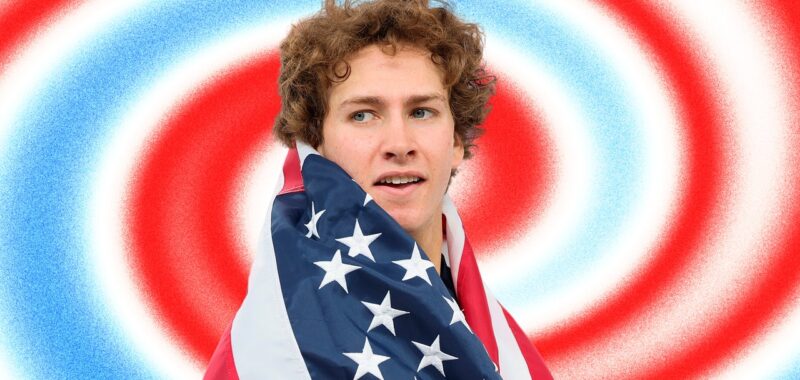I’m such a fan of Nyjah and Chris, you know what I mean? Like, I rode for Plan B with Chris Joslin forever, and I was there when he turned pro. And I grew up watching Nyjah win. So I get to share a room with these boys and pick their brains and kind of be like the little brother. Just to be able to like, mess with them and just hang out—that to me is the best. That’s the best part of the whole Olympic games.
What’s something you’ve learned from them through being able to spend all the extra time with them?
Oh my goodness. Well, considering how gnarly they both are, I feel like the one thing that I wouldn’t say they told me, but that I’ve noticed, is that there’s just a different level of commitment with Nyjah and Chris. They are the veterans on the team and they’re the veterans in skateboarding now.
What they’ve done in their careers is amazing, like what they’ve done in the streets is unbelievable. The difference between street skateboarding and park skateboarding—when you’re in L.A., just downtown, no one has done that, or been there, or skated the way you are, and they just do it. They have really pioneered the way that you commit on a skateboard. Those boys have done stuff that is just absolutely ridiculous. I sit there and fan out about them all the time and they tell me to shut up, but I’m like, you guys are ridiculous!
Just that as you get older—like, I’m 23 years old now—and as you get older, you kind of just notice that there is a different level of commitment from these guys because of how much they’ve gone through and how much they know about skateboarding.
In terms of going through a lot, I know you’re referring to their wisdom on tons of different topics, but how do you cope with injury or the threat of injury?
Depending on the injury and whether it’s severe or not, you’ve kind of just got to push through it. I mean, I’ve had all the injuries. I’ve had ankles and hips and knees and head injuries and all of that. So really, you just push through it, you know, you try not to think about it, and you just try to be positive. You commit to every trick that you do with full intent, and hopefully it goes your way.
So I know you grew up in Arizona. What was the skate scene like there?
It’s amazing and I’m grateful to say that my family had a big part in that. When I was younger, my parents owned a gymnastics gym. When I was four and my older brother was six, we fell in love with skateboarding, and my dad decided to start building these ramps in the back parking lot of the gym.
That turned into parents asking if they could put one of their kids in skateboarding lessons while the other one was doing gymnastics. My dad decided to just build a center for it, and we built a full skate park there, and now we have six facilities—five of them are in Arizona, and one of them is in Salt Lake. We do skateboarding and tons of other stuff—it’s basically all about the basic body awareness for children at a young age. You go there and have fun. There’s air mats and airbags and skate parks. It’s just a place to go and have fun.
Do you think that getting to watch kids learn the basics has kind of helped you as you’ve gone further and further into this?
A great example is my little brother Bowie, who’s, oh gosh, think he’s eight now—I’ve watched him fall in love with skateboarding. This last year and a half or two years he’s just fallen in love. I’ve realized and taken a deep appreciation for the wonder of skateboarding.

